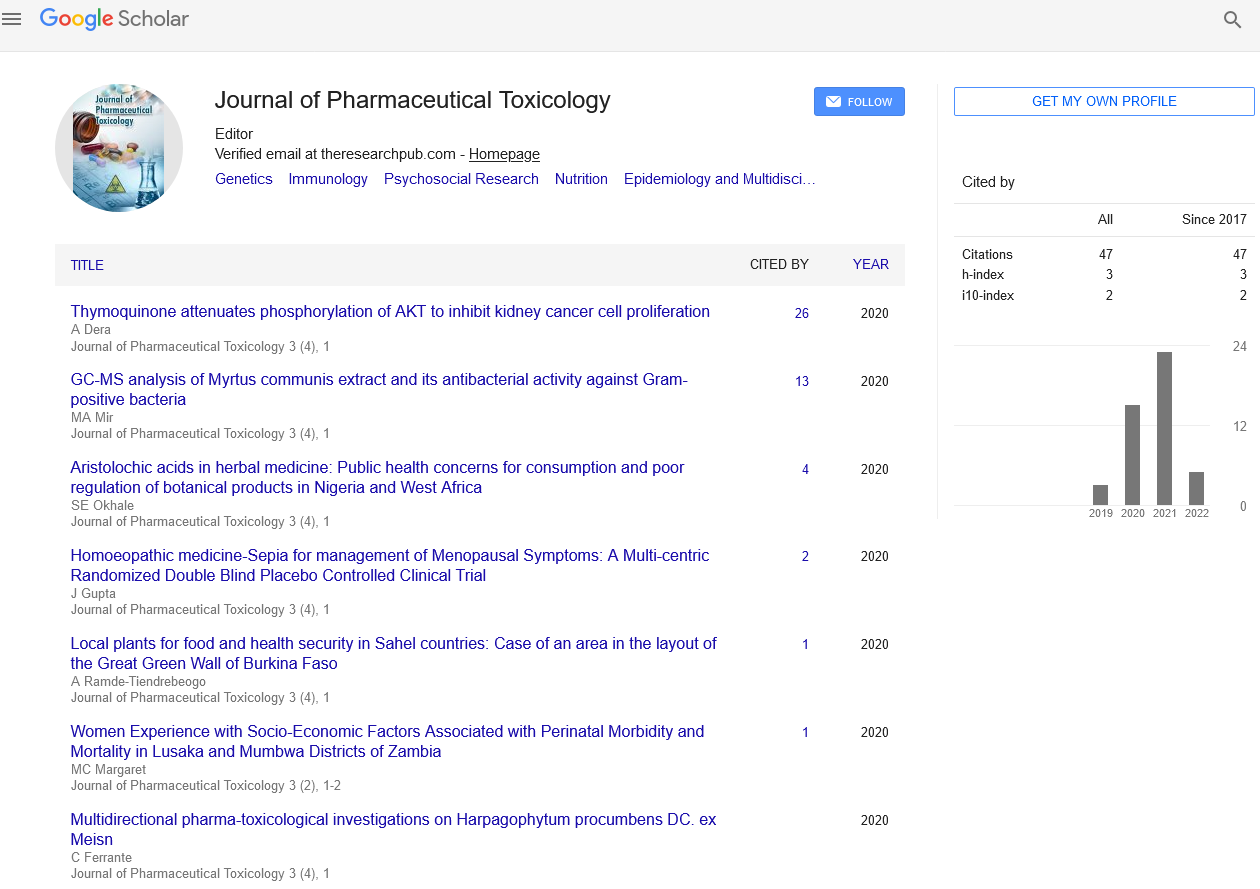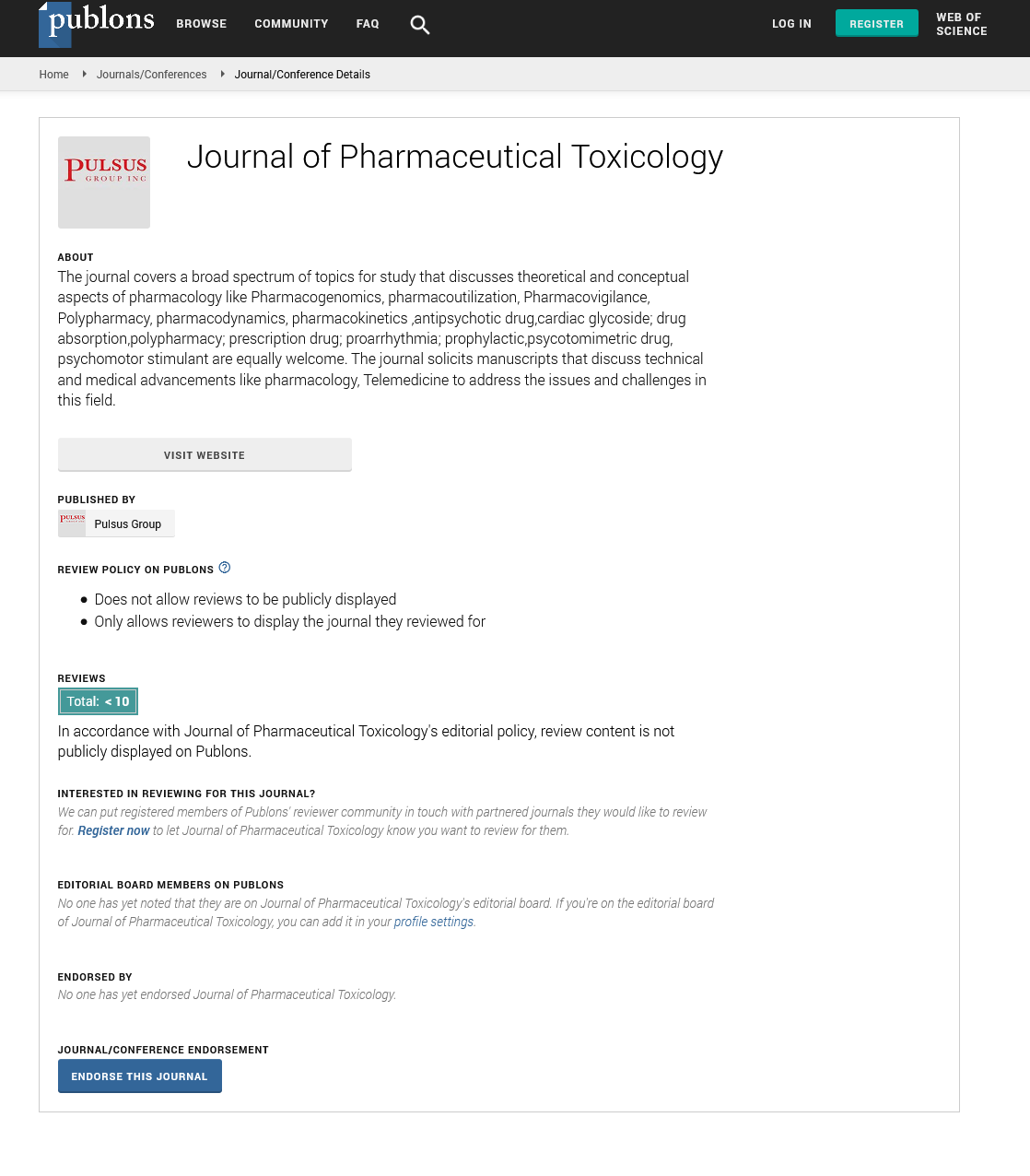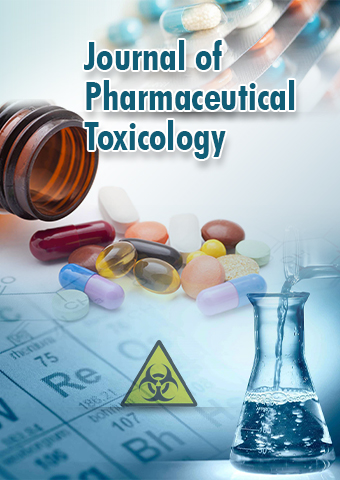Research Article - Journal of Pharmaceutical Toxicology (2023) Volume 6, Issue 4
Pharmaceutical Research Is the Development of Personalized Medicine
Riyaz Khan*
Department of Pharmaceutical Sciences, School of Applied Science and Technology, University of Kashmir, Srinagar 190006, India
Department of Pharmaceutical Sciences, School of Applied Science and Technology, University of Kashmir, Srinagar 190006, India
E-mail: riyaz.khan10@gmail.com
Received: 01-August-2023, Manuscript No. oajpt-23-108600; Editor assigned: 3- August -2023, PreQC No. oajpt-23-108600 (PQ); Reviewed: 17- August -2023, QC No. oajpt-23-108600; Revised: 22- August -2023, Manuscript No. oajpt-23-108600 (R); Published: 28- August -2023; DOI: 10.37532/ jpt.2023.6(4).135-137
Abstract
Pharmaceuticals play a vital role in modern healthcare, revolutionizing the treatment and prevention of various diseases and improving the overall quality of life for millions. Pharmaceutical companies are at the forefront of scientific innovation, constantly striving to develop groundbreaking medications and therapies that address unmet medical needs. The journey of a pharmaceutical product, from its inception to the pharmacy shelves, is a complex and rigorous process. It typically begins with extensive research and development, involving teams of scientists, researchers, and experts collaborating to identify potential drug candidates. This phase entails a profound understanding of the underlying disease mechanisms and aims to discover molecules that can effectively target and modulate them. Once promising drug candidates are identified; they undergo preclinical testing on cell cultures and animal models to assess their safety, efficacy, and potential side effects. The data collected during this stage plays a crucial role in determining whether the drug should progress to human clinical trials
Introduction
Despite these tremendous advancements, the pharmaceutical industry faces some pressing challenges. High research and development costs, regulatory complexities, and ethical considerations continue to be significant hurdles. Striking a balance between accessibility and affordability while maintaining sustainability remains a priority for pharmaceutical companies, policymakers, and healthcare providers alike of the most significant achievements in pharmaceutical research is the development of personalized medicine. By leveraging genomic data and advanced analytics, scientists can now tailor treatments to individual patients based on their genetic makeup. This approach not only enhances the effectiveness of treatments but also reduces the risk of adverse side effects, leading to more successful outcomes and increased patient satisfaction.
Moreover, the industry’s focus on rare diseases has been instrumental in providing hope for patients previously left with limited treatment options. Thanks to advancements in genetic research and drug development, numerous rare diseases now have targeted therapies that can significantly improve patients’ lives, bringing newfound optimism to those affected by these conditions. Additionally, the integration of artificial intelligence and machine learning in pharmaceutical research has accelerated drug discovery processes. These technologies can analyze vast datasets, identify potential drug candidates, and predict their safety and efficacy, saving time and resources in the drug development pipeline. As a result, the time taken to bring new medications to market has been significantly reduced, allowing patients quicker access to life-changing treatments [1-3].
Another area where pharmaceutical companies have made a considerable impact is in the fight against infectious diseases. Vaccines have been at the forefront of this battle, and ongoing research has led to the development of highly effective vaccines for various pathogens, protecting populations from devastating outbreaks. The COVID-19 pandemic demonstrated the pharmaceutical industry’s agility in responding to emergent threats, as researchers worked tirelessly to develop and distribute vaccines worldwide in record time.
However, with these advancements come challenges, such as rising healthcare costs and concerns about drug pricing. As pharmaceutical companies invest heavily in research and development, they often face pressure to balance innovation with affordability. Striking a delicate balance between sustainability and access to life-saving medications remains an ongoing debate. Nonetheless, the future of pharmaceuticals holds great promise. Researchers continue to explore groundbreaking technologies, such as gene editing and regenerative medicine, which may open up new frontiers in treating previously incurable conditions. Moreover, the collaboration between public and private sectors, as well as academia, fosters an environment of cooperation, ensuring that the best minds work together to overcome medical challenges and create a healthier world for all [4,5].
Discussion
The pharmaceutical industry’s relentless pursuit of advancements in research has transformed healthcare and brought hope to millions of patients. Personalized medicine, targeted therapies, AI-powered drug discovery, and the fight against infectious diseases are among the notable achievements. As science and technology continue to advance, the pharmaceutical sector is poised to tackle even more medical complexities and improve the well-being of individuals worldwide. The pharmaceutical industry is undergoing a remarkable revolution, shaping the way we approach healthcare and the treatment of diseases. With groundbreaking research and technological advancements, pharmaceutical companies are at the forefront of developing novel medicines that have the potential to improve the quality of life for millions.
One of the most significant breakthroughs in recent times is the emergence of precision medicine. Gone are the days of one-size-fits-all treatments; precision medicine tailors therapies to an individual’s genetic makeup, lifestyle, and environmental factors. This approach allows for more targeted and effective treatments, reducing adverse effects and maximizing therapeutic outcomes. Furthermore, the integration of artificial intelligence and big data analytics has revolutionized drug discovery and development processes. By analyzing vast amounts of data from clinical trials, genetics, and patient records, AI algorithms can identify patterns and potential drug candidates faster than traditional methods. This not only accelerates the drug development timeline but also enhances our understanding of diseases and their complexities [6,7].
Another key area of focus is the battle against infectious diseases. The global response to the COVID-19 pandemic showcased the agility of the pharmaceutical industry in developing vaccines in record time. The lessons learned from this crisis have paved the way for faster and more collaborative responses to future outbreaks. However, amidst these advancements, the industry also faces several challenges. Rising healthcare costs and drug pricing have become pressing concerns. The high costs of research, development, and regulatory processes often lead to expensive medicines, limiting access to essential treatments for some populations. Pharmaceutical companies must strike a balance between ensuring profitability and fulfilling their social responsibility to provide affordable and accessible medicines.
Moreover, the growing issue of antimicrobial resistance poses a significant threat to public health. As bacteria and viruses evolve to resist existing treatments, there is an urgent need to develop new classes of antibiotics and innovative therapeutic approaches to combat these evolving pathogens. In recent years, there has also been an increasing focus on the development of therapies for rare and orphan diseases, which were previously overlooked due to their limited patient populations. Advances in gene therapy and gene editing technologies hold tremendous promise in providing effective treatments for these conditions [8-10].
Conclusion
In conclusion, the pharmaceutical industry is undergoing a transformative journey, marked by groundbreaking advancements, challenges, and promises. Precision medicine, AI-driven drug discovery, and vaccine development exemplify the potential of science to transform healthcare. However, ethical considerations, accessibility, and the fight against emerging health threats remain crucial factors that the industry must address to ensure a healthier and more equitable future for all. By combining innovation with responsible practices, pharmaceutical companies can continue to shape a world where lifechanging medicines are within reach for every individual in need. In conclusion, the landscape of pharmaceutical research has experienced a transformative shift in recent times, driven by breakthrough technologies and collaborative efforts. Personalized medicine, AI-driven drug discovery, immunotherapy, nanotechnology, and collaborative research initiatives are shaping the future of healthcare. As we continue to build on these advancements, it is evident that the pharmaceutical industry’s relentless pursuit of innovation holds the promise of better, more tailored and accessible treatments for patients globally.
References
- Van den Anker J, Reed MD, Allegaert K et al. Developmental Changes in Pharmacokinetics and Pharmacodynamics.J Clin Pharmacol.58, 10-25(2018).
- Aagaard L. Off-Label and Unlicensed Prescribing of Medicines in Paediatric Populations: Occurrence and Safety Aspects. Clin Pharmacol Toxicol.117, 215–218(2015).
- Gore R, Chugh PK, Tripathi CD. Pediatric Off-Label and Unlicensed Drug Use and Its Implications.Curr Clin Pharmacol. 12, 18–25(2018).
- Sketris, I.S.American Geriatrics Society Beers Criteria®Update Expert Panel. American Geriatrics Society 2019 Updated AGS Beers Criteria®for Potentially Inappropriate Medication Use in Older Adults.J Am Geriatr Soc.67, 674–694 (2019).
- Hill-Taylor B, Walsh KA, Stewart S et al. Effectiveness of the STOPP/START (Screening Tool of Older Persons’ potentially inappropriate Prescriptions/Screening Tool to Alert doctors to the Right Treatment) criteria: Systematic review and meta-analysis of randomized controlled studies.J Clin Pharm Ther.41, 158–169 (2016).
- Tommelein E, Mehuys E, Petrovic M et al. Potentially inappropriate prescribing in community-dwelling older people across Europe: A systematic literature review.Eur J Clin Pharmacol.71, 1415–1427.
- Prot-Labarthe S, Weil T, Angoulvant F et al. POPI (Pediatrics: Omission of Prescriptions and Inappropriate prescriptions): Development of a tool to identify inappropriate prescribing.PLoS ONE.9,25-68.
- Corrick F, Conroy S, Sammons H et al. Paediatric Rational Prescribing: A Systematic Review of Assessment Tools.Int J Environ Res Public Health.17, 1473-1496(2015).
- Sadozai L, Sable S, Le E Roux et al. International consensus validation of the POPI tool (Pediatrics: Omission of Prescriptions and Inappropriate prescriptions) to identify inappropriate prescribing in pediatrics.PLoS ONE.15, 47-72 (2018).
- Barry E, Moriarty F, Boland F et al. The PIPc Study-application of indicators of potentially inappropriate prescribing in children (PIPc) to a national prescribing database in Ireland: A cross-sectional prevalence study.BMJ Open.8, 69-556 (2019).
Indexed at, Google Scholar, Crossref
Indexed at, Google Scholar, Crossref
Indexed at, Google Scholar, Crossref
Indexed at, Google Scholar, Crossref
Indexed at, Google Scholar, Crossref
Indexed at, Google Scholar, Crossref


